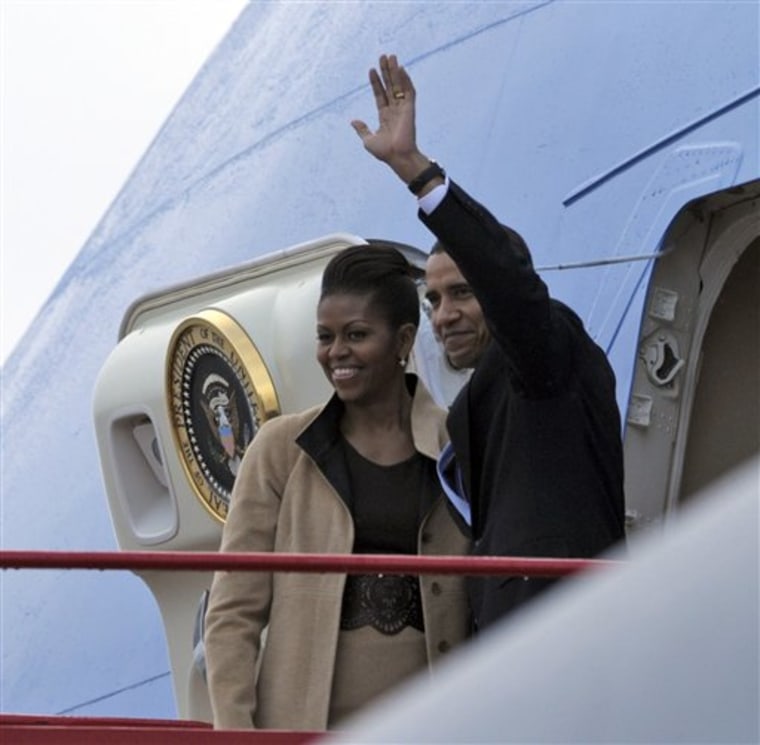With a Nobel Peace Prize in hand, President Barack Obama returned to the grind of governing, refocusing on his top domestic priority as the Senate moves toward a pivotal moment on legislation to remake the nation's health care system.
Obama arrived Friday from Norway after becoming the first chief executive to collect the storied award so early in his tenure. He blitzed through his Nobel itinerary, then met privately with U.S. embassy staff at his hotel in Oslo before returning to a huge agenda hanging in the balance, including health care and another European trip next week for a climate summit.
Senate Majority Leader Harry Reid is working privately to secure support among Senate Democrats for a tentative deal to expand the government' role in health care. The potential breakthrough in the long health care debate was reached last weekend, and Democrats are driving for a final vote before Christmas. The House already has passed its bill.
Obama's goal — to expand coverage to those without it, improve it for those who do and rein in the crushing costs of health care — remains at the core of his political efforts. Congress has spent months trying to get out a bill that satisfies its own blocs and Obama.
The focus on health care, however, will be brief. Obama will be returning to Europe next Friday — to Copenhagen this time — to join scores of leaders from around the globe in final negotiations on a pact to aimed at stemming emissions blamed for global warming.
Senators supporting climate legislation offered a revised proposal Thursday that calls for a 17 percent reduction in U.S. greenhouse gas emissions by 2020, similar to the reductions Obama has said he will call for at the Copenhagen talks. Press secretary Robert Gibbs hailed the measure as "a significant step in the effort to pass comprehensive energy reform."
The bill also includes incentives for building nuclear power plants, and it would open the way for possible expanded oil and gas drilling off the nation's coastlines. Both are seen as key to attracting Republican support needed to win Senate approval of the climate bill.
Before boarding Air Force One Friday morning, Obama exchanged a few words with Norwegian Nobel Committee Chairman Thorbjorn Jagland and the committee's permanent secretary, Geir Lundestad.
"He was pleased, very thankful ... ," Lundestad told reporters after talking to Obama before his departure.
Lundestad said Obama had worked on his Nobel speech "through the night" before accepting the prize.
"He slept one or two hours. The president himself wrote most of the speech," Lundestad said. "He wouldn't have done that if he didn't care about it."
In accepting the peace prize, Obama spelled out a doctrine of justifiable war and the steps needed for a "just and lasting peace."
The hawkish message was an inevitable nod to the controversy defining his selection: an American president, lauded for peace just as he escalates the long, costly war in Afghanistan. He accepted the peace prize just nine days after ordering 30,000 more troops to Afghanistan.
"I face the world as it is, and cannot stand idle in the face of threats to the American people," Obama told his audience in Oslo's soaring City Hall. "For make no mistake: Evil does exist in the world."
And yet for all the talk of might — as Obama put it, the tools of war have a role in preserving peace — he also stressed the need to avoid conflict.
He called for alternatives to killing, like sanctions with true bite. He defined peace as civil rights, free speech and economic opportunity, not just the absence of conflict. And he pushed himself away from George W. Bush, defending diplomacy that engages even enemies.
Obama was chosen for the award more for his aspirations and approach than his accomplishments thus far. The Nobel committee honored him for changing the tenor of international politics and pursuing goals that the winner himself says will take a world effort, like nuclear disarmament and reversing global warming.
At a dinner in his honor Thursday night, Obama paid tribute to his mother, who died before his election to the presidency.
"To the extent I am deserving of this esteemed prize, either now or in the future, it will be largely because of her and the largeness of her heart," Obama said.
